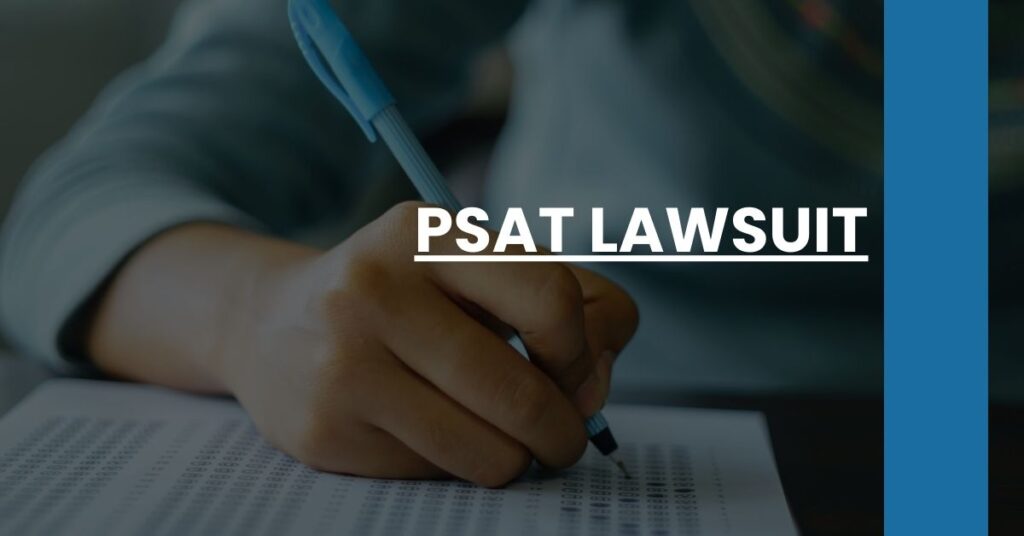The PSAT lawsuit is a case against the College Board, accusing them of selling student data without proper consent, breeching privacy laws. It’s a pivotal moment for student rights and data protection, with implications that could reshape the future of standardized testing.
If you’re a student or parent, this lawsuit could directly impact you:
- Privacy: How your educational data is handled.
- Consent: The way organizations seek permission to use your information.
While the article below explores every facet of this defining case, knowing the gist of the lawsuit arms you with the essential information you need.
- Understanding the PSAT and Its Purpose
- The Roots of the PSAT Lawsuit
- Allegations Against the College Board
- The Legal Framework Surrounding Educational Data
- Potential Implications for Students and Parents
- Reactions from the Educational Community
- Previous and Parallel Litigations
- Understanding Class Action Lawsuits
- How the Outcome of the Lawsuit Might Affect the Future of Standardized Testing
- Conclusion: The Larger Significance of the PSAT Lawsuit
Understanding the PSAT and Its Purpose
The Preliminary SAT, more commonly known as the PSAT, is not just a precursor to the SAT but a multipurpose standardized test that can significantly influence your high school years. Serving as both practice for the SAT and a qualifying test for the National Merit Scholarship Program, it’s a pivotal step in your educational journey.
- Practice for the SAT: By taking the PSAT, you’re introduced to the types of questions and the format you’ll later encounter on the SAT. This firsthand experience can be invaluable as you prepare for one of the most important tests in your academic career.
- National Merit Scholarship Program: Scoring highly on the PSAT can also open doors to scholarship opportunities. It’s the initial filter for the National Merit Scholarships, which can be a noteworthy accolade on your college applications.
By grasping the PSAT’s dual role, you can better understand why any legal issues surrounding it, such as the psat lawsuit, could have far-reaching consequences for students like you.
The Roots of the PSAT Lawsuit
What prompted this legal scrutiny of such a pivotal exam? It began when the College Board, the organization responsible for the PSAT, faced allegations that hit close to home for any student—privacy invasion. A class-action lawsuit was brought forth, which claimed that your personal data might have been sold to third parties without your explicit consent.
Imagine sitting down to take a test that could shape your academic future, only to later find that your test-taking came with strings attached—your personal information possibly being used in ways you didn’t agree to. That’s the core of the concern driving this psat lawsuit. The issues stem from the Student Search Service, a College Board program that was purportedly marketed as a way to connect you with colleges but may have doubled as a revenue stream through data selling.
Allegations Against the College Board
As per these allegations, your trust as a test-taker might have been taken for granted. The claims suggest that while you were focused on filling in the right bubble on your answer sheet, your personal information—from test scores to phone numbers—was being priced at $0.45 per data point to colleges, universities, and scholarship programs.
This practice, if substantiated, flouts the ethical standards you’d expect from an educational institution. It insinuates a breach of trust that can leave you wary of participating in future standardized tests. For transparency, students and parents rely on organizations like the College Board to safeguard student data, not to commodify it. These practices, challenged in the psat lawsuit, have brought to light critical questions about data privacy within the academic realm.
The Legal Framework Surrounding Educational Data
When you hand over your personal information, whether it’s for the PSAT or any other educational activity, you’re protected by specific laws. The Family Educational Rights and Privacy Act (FERPA) and the Protection of Pupil Rights Amendment (PPRA) set stringent restrictions on how your education records can be used and released.
FERPA grants you the right to access your education records and requests the consent for the disclosure of those records, making the allegations in the psat lawsuit particularly unsettling. The PPRA further protects your rights, requiring written parental consent for the collection of personal information for marketing purposes—something that seems to be at the heart of the dispute here. For a detailed understanding of your rights under these laws, the U.S. Department of Education’s student privacy guidelines provide valuable information.
Potential Implications for Students and Parents
If the allegations in the psat lawsuit prove to be true, it might make you question the trustworthiness of the very institutions designed to facilitate your educational advancement. This isn’t just a simple case of data misuse; it’s a question of how your aspirations and efforts can be affected by the mishandling of personal information.
Should the lawsuit result in policy changes or settlements, it could lead to:
- A marked shift in how educational organizations manage and protect student data.
- Reformed transparency about the scope and intent behind data collection during exams.
- Increased skepticism and demand for privacy assurances from you and your parents when engaging with standardized tests in the future.
The outcome of this legal action could very well redefine the relationship between students and educational testing services, with your privacy taking center stage.
Reactions from the Educational Community
When news of the PSAT lawsuit spread, the ripples touched every corner of the educational community. Your teachers, school counselors, college admissions officers, and academic advocates all had a stake in the fallout, and their reactions were varied.
Some educators expressed concern about the erosion of trust between students and the institutions meant to safeguard their futures. There were calls for more rigid adherence to privacy standards and an earnest plea for organizations like the College Board to safeguard student data with utmost integrity.
Students and parents, like you, who might once have interacted with the College Board’s services without a second thought, are now more likely to scrutinize the fine print and seek assurances that their rights are being respected. A shared sentiment among the community is that the sanctity of student data must be preserved, with many holding their breaths for the outcomes that could arise from the lawsuit.
Previous and Parallel Litigations
Understanding the PSAT lawsuit becomes all the more relevant when you consider that it isn’t occurring in isolation. The litigation pattern paints a larger picture of ongoing concerns surrounding data privacy, and each case can influence another. For example, if you look into historical lawsuits against testing organizations, you’ll find that this isn’t the first time such issues have come to light.
In 2014, a lawsuit against ACT, Inc., claimed that the organization sold student disabilities data to postsecondary institutions, a case that bolsters the gravity of the current psat lawsuit. Although each legal challenge is unique, the echoes between them suggest a persistent atmosphere where student data can be a bargaining chip if left unchecked.
Understanding Class Action Lawsuits
For clarity on what a class-action lawsuit entails and why it matters to you, think of it as a collective ‘David versus Goliath’ scenario. Instead of individuals grappling with large organizations alone, a class action enables groups of people, potentially including yourself, to combine their similar complaints. This method amplifies the assertion that such claims as those associated with the PSAT lawsuit warrant a closer examination of policies and practices.
By engaging in a class-action lawsuit, your voice and concerns about privacy become an essential part of a chorus that demands change. And while the PSAT lawsuit is a complex legal undertaking, its essence is your fundamental right to control your personal information.
How the Outcome of the Lawsuit Might Affect the Future of Standardized Testing
As you await the verdict, it’s natural to speculate on how the case’s resolution might reshape standardized testing. A ruling in favor of students would potentially usher in stringent regulatory measures governing how organizations like the College Board handle personal data. Greater transparency and accountability may become the new normal, with your privacy interests being at the forefront of operational protocols.
On the flip side, academic institutions may become more cautious or perhaps even overly restrictive in their data practices. This could influence not only how tests like the PSAT are administered but also how educational data is used to connect you with learning opportunities and scholarships.
What’s certain, is that the landscape of standardized testing is bracing for possible upheaval, a change that directly impacts your journey through academia.
Conclusion: The Larger Significance of the PSAT Lawsuit
As we wrap up this detailed dissection of the psat lawsuit, let’s acknowledge that at its heart, it is more than a legal battle—it is a pivotal moment for student privacy. The decisions forthcoming from this case are likely to set a precedent. You, as a student or parent, stand on the cusp of potentially transformative changes in the way educational data is treated.
This era of heightened digital scrutiny makes your data more vulnerable yet more guarded by laws than ever. It’s up to rulings like those in the PSAT lawsuit to solidify these protections and ensure educational advancement never comes at the cost of your right to privacy.
Navigating the world of academia is challenging enough without the added worry of data misuse. As you follow the updates of the psat lawsuit, keep in mind that its outcomes could very well be a defining moment for your own educational narrative.

